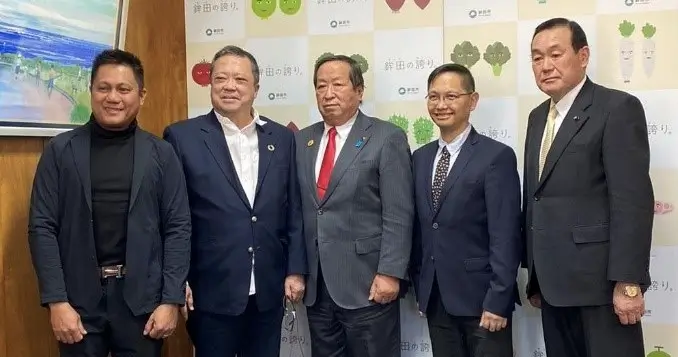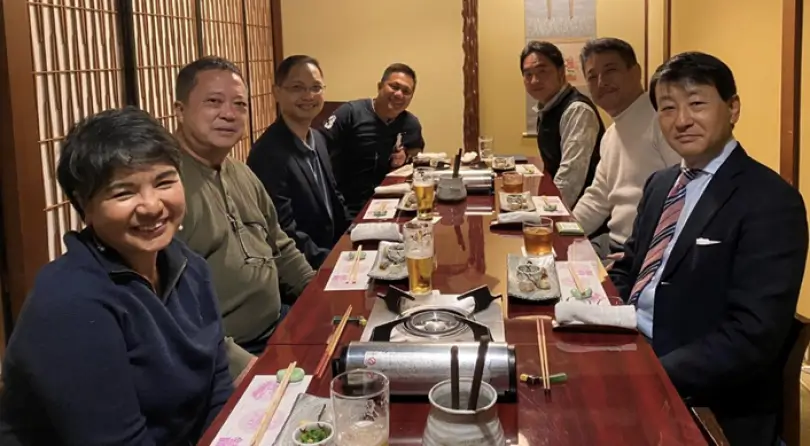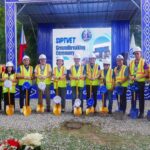Murcia, Tricastle to send agri, hotel trainees to Japan


In collaboration with Tricastle International and its Japanese and Chinese partners, the Municipality of Murcia in Negros Occidental is working for the deployment of Murciahanon agricultural and hotel services trainees to Japan.
“Our initial trip to Namegata City in Ibaraki Prefecture last July 2022 to send agricultural trainees to Japan has borne fruit. In our trip last February 20 to 24 with 3rd District Rep. Francisco ‘Kiko’ Benitez and Tricasle co-founder Vice Mayor Johnny Reosura, we have finalized the arrangements for the signing of the Memorandum of Agreement with our partners,” Murcia Mayor Gerry Rojas said in a press release Monday, March 6.
The three officials, together with Tricastle President Leah Tinsay, met with Multi Contractor Cooperative (Marucon) Chairman Kazuo Arai, Vice-Chairman Masaki Miyai and Executive Director Toshiki Koyama, to discuss the expansion of the Negrense work forces from the construction industry into agriculture and hotel services.

“We also met with one of our partners, the Koryu Chushin / Chinese-Japan Agricultural Cooperative headed by Chairman Ryu Bin and Executives Maxin Rong and Wang Yu. They arranged for us a visit to a sweet potato farm in Hokota City,” Reosura said.
They paid a courtesy call on Hokota City officials led by Mayor Kazuo Kishida and Vice-Mayor Shigeki Igawa, and they discussed the arrangements for the training of agriculture technical interns and the agreement for the sisterhood between Murcia and Hokota City.
Located approximately 90 kilometers northeast of Tokyo, Hokota City in Ibaraki Prefecture is primarily agricultural, though it has a long shallow coastline, with its eastern side facing the Pacific Ocean.
The city has an estimated population of 45,997 (as of July 1, 2020), which has remained stable for 70 years. About one-third of its residents are aged over 65 years old. Hokota has an area of 20,760 hectares, which is mostly flat terrain ideal for agriculture.
In contrast, Murcia has a population of almost 89,000 (based on 2020 census), spread over an area of 27,914 hectares. More than 60 percent of Murciahanons are aged between 15 to 64 years old, representing the actual or potential members of the town’s work force.
In June, Tricastle and its partners will sign in Murcia the agreement with Hotta Bio Farm officials for the deployment of the first batch of agriculture technical interns in Hokota City. Hotta Bio Farm produces vegetables, mostly mint leaves used as garnish in sushi and sashimi, the press release said.
“We also visited the Hokubo Steel Fabrication Plant, where we were welcomed by Hokubo Chairman Katsuyuki Chida. He gave us a tour of the facility and the dormitory which houses the Negrense workers, most of whom are Murciahanons who were happy to see and talk with their fellow Negrenses,” Rojas said.
Reosura explained that Tricastle has been sending construction trainees to Japan since 2001, through NJ Builders and its Japanese partner Marucon. In 2014 when a Chinese partner joined them, they formed Tricastle International, aiming to expand their manpower deployment and training to China.
The trainees undergo a three-year internship in the construction industry in Japan, where they further hone their skills in welding, masonry, carpentry, steelworks and urethane spray application.
This year, agriculture trainees will also be sent to Japan, while Tricastle is working on sending hotel services trainees, too. Marucon will receive and further orient the trainees, and they will then be turned over to Koryu Chushin, who will assign the trainees to their respective agricultural cooperatives.
“After their three-year internship, they will go home to the Philippines, but they are given the option to return to Japan and, through another of our partners, Marutora, be hired by the company which trained them or by other companies,” Reosura said.*






